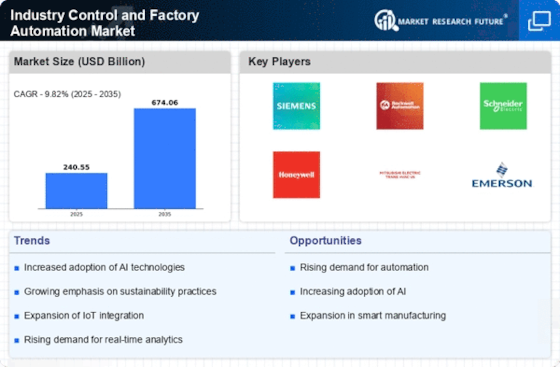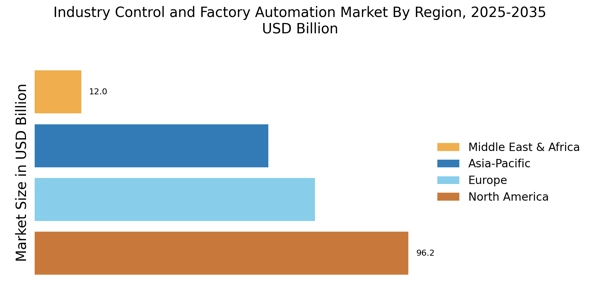Major market players are spending a lot of money on R&D to increase their product lines, which will help the Industry control and factory automation Market grow even more. Market participants are also taking a range of strategic initiatives to grow their worldwide footprint, including new product launches, contractual agreements, mergers and acquisitions, increased investments, and collaboration with other organizations. Competitors in the Industry control and factory automation Market industry must offer cost-effective products to expand and survive in an increasingly competitive and rising market environment.
One of the primary business strategies adopted by manufacturers in the global Industry control and factory automation industry to benefit clients and expand the Industry control and factory automation market sector is to manufacture locally to reduce operating costs. The market for Industry control and factory automation is recognized as being extremely competitive and fragmented. The market for Industry control and factory automation offers considerable potential opportunities for domestic and unorganised companies.
Some of the key players operating in the Industry control and factory automation Market are Yokogawa Electric Corporation, Omron Corporation, Endress+Hauser, Fanuc Corporation, WIKA, Mitsubishi Electric Corporation, Eaton Corporation, Danfoss, Rockwell Automation, Yaskawa Electric Corporation, Toshiba Corporation, Honeywell International Inc., Dwyer, Stratasys, Hitachi, HP. 3D Systems, ABB, Schneider Electric, Siemens, General Electric, and Emerson Electric Co. To increase their global reach and client base, key firms are concentrating on acquisitions and product innovation.
Eaton Corporation: is a multinational power management company. The company provides energy-efficient solutions that help its customers effectively manage electrical, hydraulic, and mechanical power more efficiently, safely, and sustainably. Eaton operates through five operating segments, namely, electrical products, electrical systems and services, hydraulics, aerospace, and vehicle. The electrical products comprise industry automation, industrial components, residential products, single-phase power quality,
emergency lighting, fire detection, wiring devices, structural support systems, circuit protection, and lighting products.
The electrical system and services include power distribution and assemblies, three-phase power quality, hazardous duty electrical equipment, intrinsically safe explosion-proof instrumentation, utility power distribution, power reliability equipment, and services. The hydraulic segment includes various power products, control and sensing products, and fluid conveyance products. The company has operations in the US, Canada, Latin America, Europe, and Asia-Pacific.
Rockwell Automation: is a leader in industrial automation and digital transformation. The company has product brands such as Allen‑Bradley, FactoryTalk, and Lifecycle IQ Services. The company provides a vibrant environment where people can create a successful career by tackling complex, real-world problems that expand human potential. It has various industry sectors such as aerospace, automotive & tire, chemical, entertainment, food & beverage, infrastructure, life sciences, and semiconductor.
The company has various products such as circuit & load protection, condition monitoring, connection devices, distributed control systems, drivers & motors, energy monitoring, human-machine interface, independent cart technology, industrial computers & monitors, input/output modules, industrial control products, lighting control, motion control, motor control, networks security & infrastructure, packaged solutions, and power supplies. It provides services across more than 80 countries.

















